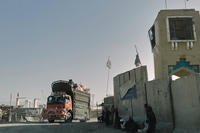The Pentagon said Tuesday it has suspended security cooperation with Niger due to the political unrest in the West African nation, but U.S. troops are not being evacuated, and some are still even continuing to engage with members of the country's military.
"There's no imminent threat against any U.S. personnel or American citizens," Brig. Gen. Pat Ryder, the Pentagon's top spokesman, told reporters Tuesday.
Ryder said that while the security cooperation between the U.S. and Nigerien military has been suspended, "we maintain close contact with our Niger military counterparts in the country, as the situation continues to unfold" and "when necessary [and] environment permitting," service members are still able to go off base to foster that engagement.
Read Next: Public's Confidence in the Military Drops Again
Niger's democratically elected leader, President Mohamed Bazoum, was put under house arrest late last week when part of the country's military mutinied. The news became public in the early hours of July 27, shortly after several military leaders appeared on TV and declared a curfew and the closing of the country's borders "until the situation stabilized," the Associated Press reported.
Bazoum was elected president two years ago in the nation's first peaceful, democratic transfer of power since its independence from France in 1960. He has not resigned his office since being detained.
Now, nearly a week later, Ryder is hesitant to describe the situation as a coup -- a term that carries legal implications for U.S. foreign policy -- and instead stressed that military leaders are closely monitoring the situation there.
"It continues to remain very fluid," he said, before adding that "it's too soon to characterize the nature of ongoing developments."
The Pentagon announced that Joint Chiefs Chairman Gen. Mark Milley spoke with Niger's Armed Forces Chief of Defense Lt. Gen. Issa Abdou Sidikou on Thursday by phone and, according to a readout of the call, the two men "discussed the safety of Americans and the developing situation in Niger."
On Monday, Milley also spoke with the French defense chief about the situation in Niger.
Meanwhile, State Department spokesman Matthew Miller confirmed that Secretary of State Antony Blinken had spoken to Bazoum several times last week.
Ryder said that no U.S. forces have been pulled out of the country but noted that "we're always going to plan for various contingencies."
He also pushed back on reports and speculation that Russian mercenary leader Yevgeny Prigozhin was involved in the incident.
"Based on the information that I have, we see no indication that Wagner played a role in this particular action," Ryder explained, referring to the mercenary group run by Prigozhin.
Various international news outlets reported that Prigozhin took to social media after the Nigerien military seized power to praise the move and to offer his fighters' services.
"We are going to continue to be focused on using diplomatic tools to try to preserve Niger's hard-earned democracy," Ryder stressed.
-- Konstantin Toropin can be reached at konstantin.toropin@military.com. Follow him on Twitter @ktoropin.
Related: West African Nations Threaten to Use Force if Niger's President Isn't Reinstated Within a Week












